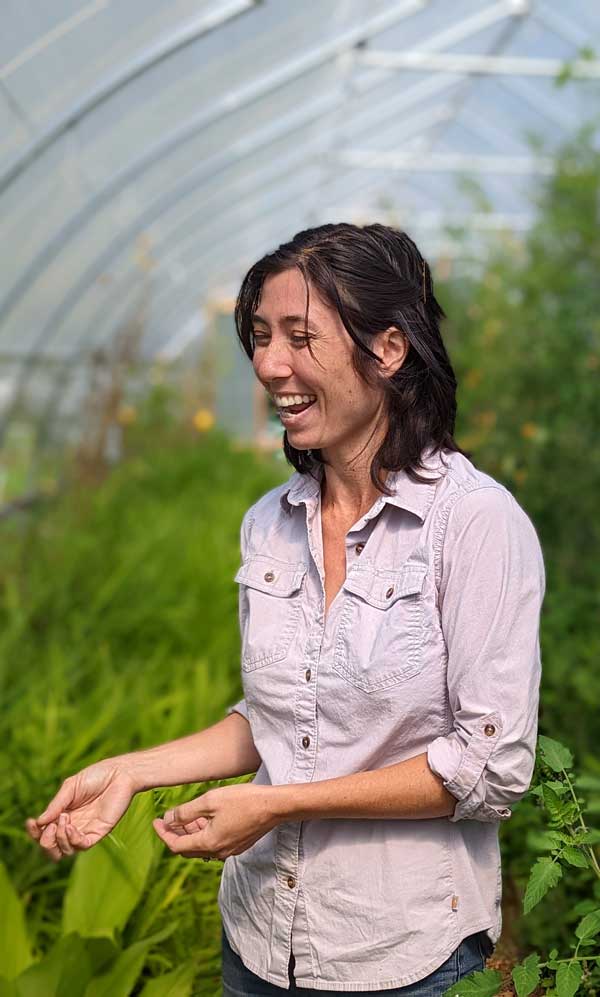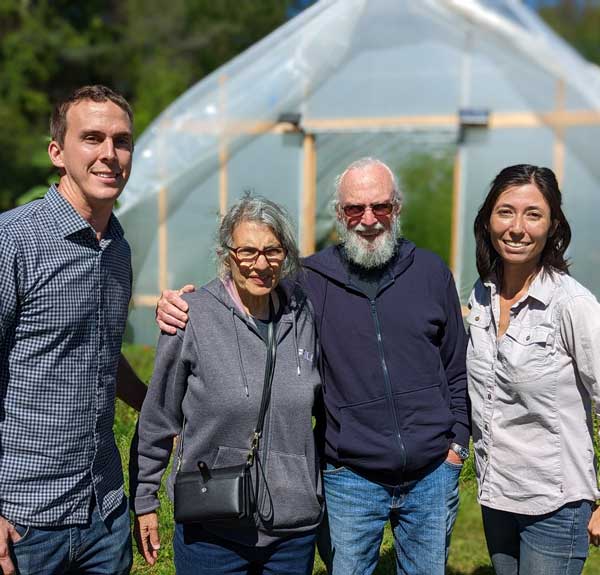Written and Photographed by David Johnson
It was mid-September and the late morning breeze carried with it a touch of autumn chill. Cars began to pull into the parking lot of Bruton & Berube law offices in Dover. Their occupants made their way into the office conference rooms. Their tasks: signing mountains of paperwork. And as mundane as that may sound, for Stephen and Rhoda Capron and Brian Fluharty and Linh Aven, two married couples separated by four decades of life, these were going to be some of the most emotion-inducing signatures they would ever put to paper.
You can sense the importance of the moment by the tells in the room; the Caprons were energized from the get-go, impressive considering they had made landfall the night before, following a cross-country flight from Seattle (their new home and, more importantly, home to their grandchildren). Across the table, Brian and Linh largely kept an even keel – amiable, of course, but if you listened hard enough you could hear the butterflies fluttering in their stomachs.
Something big was coming. And as Stephen and Rhoda took the pens in their hands and began scrawling on the papers in front of them, Brian and Linh traded the faintest of glances, a wordless exchange that will always remain between them and them alone, though the general substance of which was intimated when Brian gently took Linh’s hand in his: “Our lives are about to change forever.”
In 1979, Stephen and Rhoda purchased their 31-acre plot of land in Nottingham. At that time, they were leasing a farm in Litchfield, fine-tuning their gardening game, and envisioning a working farm on their newly purchased acreage. After they purchased the land, Stephen split his time between work and building their house. When they eventually moved in, their farming dream took a back-seat to raising a family, and as the years passed, their agricultural designs faded.
Fast forward to 2022: their children have long since grown up, moved away, and had kids of their own. Stephen and Rhoda eventually realized that Nottingham was not going to be the preferred destination for future Capron generations, with their own families in Washington state. But, perhaps, it could be home to a new generation. So, they decided to conserve their property and they contacted SELT. Jeremy Lougee, SELT’s Senior Conservation Project Manager and Farmland Coordinator, floated an idea to connect with young farmers to carry on in their stead.
“The Caprons are long-time supporters of SELT and have enjoyed hiking on our properties,” Jeremy says. “When they made the difficult decision to sell the property and move to Seattle to be with family, they first wanted to protect the land with a conservation easement. Over their 40+ years of ownership, they cared greatly for this land and didn’t want to see their conservation ethic and good stewardship erased by the quick money of a housing development.”
As SELT’s point person for farmland conservation projects, Jeremy has morphed into a valuable resource for landowners looking to conserve and young farmers looking to own, the matchmaker of the local agriculture scene. Tapping into his connections, he was able to introduce the Caprons to potential young farmers. Linh and Brian showed the most interest and took the necessary steps to get the property under agreement.
And so, Stephen and Rhoda met Linh and Brian and the wheels of farmers' fate began to turn.
Shifting Gears
Farming and food production were so far away from Linh’s collegiate orbit that a career in competitive spelunking would have been just as likely. Born and raised in southern California, Linh found her fast lane on the academic track, and all signs pointed to a long and lucrative career filled with post-grad papers and peer review.
After her undergraduate degree in Biology at Whitworth University in Spokane, WA, she attended the Boston University School of Medicine for graduate school and eventually received her Ph.D. in Molecular Medicine. There she met her husband Brian, who was simultaneously earning his own Ph.D. in Biochemistry. That’s enough collected brainpower to solve any number of the world’s most intellectually impenetrable problems, up to and including yesterday’s Wordle.

“I love animals too much and I was in a mouse lab!” she says. “I realized that I have always loved food. So, I ended up working at a French bakery. It was a total switch, because of how much time I had invested in my education. But I just jumped in.”
Specifically, she jumped directly into baker’s hours, working shifts starting at 4:00 am for two years. Slinging pastries was fun, but it didn’t completely fan her foodie flame, so Linh began working as a chef at a national restaurant chain, where she learned all about the world of corporate recipes for a 60+ restaurant chain.
Creating these precise dishes that would be replicated by others at scale still didn’t square with what she wanted to do with food, so the next phase beckoned. That meant starting her own farm, although she and Brian were still living in a studio apartment in Boston.
“I dove into permaculture and biodynamics and natural farming practices,” she says. “And when COVID hit, I literally spent a year on my couch researching farming and figuring out exactly how I wanted to farm.”
The isolated “reset” of time the pandemic allowed Linh to unleash the academic side of her brain and identify what she wanted to do as a farmer – and, more specifically, as a farmer farming on her own land.
“I was in my zone,” she says, laughing. “And when I felt like I had researched enough and knew what I wanted to do on paper, we just couldn’t find land, couldn’t find a home. We looked everywhere.”
Linh and Brian came up empty and with the housing market burning white-hot during 2020, they had to be creative about next steps. This led them to a farming co-op in the New Hampshire seacoast where they spent a year working with other farmers on the same property. The silver lining: “It was a nice little bubble so I could explore the process of actually being a farmer,” she says.
And the added bonus: “I had friends there who introduced me to SELT,” she says, “and so I got in touch with Jeremy, and I remember he said, ‘We might have this property but it’s probably going to take a long time.”
That property was, of course, the Caprons’, and Linh and Brian were put on a prospect list. Over the course of 10 months that list grew shorter, and in 2021, following several meetings with the Caprons, it was clear that Linh and Brian took this opportunity seriously and showed they had a plan and were willing to follow through. Stephen and Rhoda had found their successors.
“I can’t think of a better couple to take over the land,” Stephen says. “They were everything we were hoping for.”
“It gave us such peace of mind,” Rhoda adds. “What made our move easier was knowing that the property was being conserved and owned by people who shared our same values.”
In April 2022, Linh and Brian moved to Nottingham and began leasing, with a goal of purchasing the land once SELT had completed the conservation easement on the property. SELT partnered with Nottingham’s Conservation Commission, who agreed to cover the project expenses related to the conservation easement (it must be said, and applauded, that the Caprons sold the easement at a bargain sale price that was far, far below its market value).
“I can’t think of a better couple to take over the land. They were everything we were hoping for.”
“The Nottingham Conservation Commission and its Board of Selectmen were supportive of this project from the start,” Jeremy says. “I cannot stress enough the importance of community engagement in the conservation process. SELT simply could not do this work without funding from our municipal partners.”
Bringing along the next generation of farmers is critical to the New Hampshire agricultural scene. Today, five times as many farmers in the Granite State are over 65 years old than those under 35. And from 2001–2016, 11,600 acres of agricultural land in New Hampshire was developed or compromised.
“We’re very fortunate in our region to have such an active local food scene,” Jeremy says, “but keeping our farmland productive and viable over the long term requires a significant investment on behalf of farmers, consumers, and their communities alike.”
Linh and Brian represent that investment. And they are acutely aware of the rarity and significance of this.
“The more time we spend here, the more perfect it is,” Linh says. “It’s kind of like a Miracle on 34th Street situation. This is not just any home. We were meant to be here in so many ways. It is exactly what I dreamed of.”
And Dandelion Forest Farm was born.
A Dream Fulfilled

Stephen notes he had been nervous about coming back, fearing he’d be very emotional, considering his family’s home of four decades was no longer in the family. But the theme of the day is fate, and the synchronicity of the events that brought these four people together, fulfilled a kind of destiny – and fulfilled destiny brings peace. And that’s what the Caprons felt, stepping out of their car, guests now instead of owners. Peace. Ease. And a healthy dose of amazement.
“What you have done here is incredible,” Rhoda said to Linh as the group toured Dandelion Forest Farm.
Truly, what Linh and Brian were able to pull off in six months is staggering. Corn growing nine feet high, along with beans and squash (the Three Sisters approach, an indigenous growing technique that Linh was eager to adopt) sit adjacent to another garden that is densely packed with all manner of edible plants – kale, spinach, elderberry, chestnuts, and many perennials researched and seeded to introduce a whole new palate of tastes and sensations to the region. Bees buzz around the garden, a Shangri-la for pollinators. The nearby hoophouse contains other delicacies and curiosities, many of the international variety, which is important for Linh, who is half Vietnamese.
“We’re an agroforestry farm, so we farm with trees along with annual crops,” Linh says. “Our main focus is on edible perennial plants. Now that we own our own land, I can grow long-lived trees with peace of mind. I can grow perennial fruits and perennial berries.
There are so many edible crops growing wild around us already, and we want to put the spotlight on them.”
Community members get the chance to experience these new tastes at Dandelion Forest Farm’s semi-regular “farm-to-table” meals, events that provide revenue and awareness for what Linh is growing and researching: the blending of centuries-tested indigenous practices with the latest advances in modern permaculture, mixed with a generous helping of international agro-know-how. These gatherings are often sold out.
“Ultimately, what we want is for people to grow their own food and to show them that it’s really easy,” she says. “You can take your lawn, put down a piece of cardboard and turn that into a growing space. When a seed planted in the soil grows into a plant, it’s a little miracle!”
As the tour concludes, the Caprons once again compliment Linh and Brian for all they have accomplished and wish them luck in the future. Stephen and Rhoda climb into their car, wave out the windows, and drive away.
Linh waves back, and picks up a pine cone that dropped from a towering pine tree at the mouth of the property; it’s a tree that Stephen had planted himself when he and Rhoda first moved in forty years ago. Linh shows it off with enthusiasm and tells how she will take this bounty from the land managed by her predecessors, soak it in a brown sugar blend, where it will ferment and, after time, release new and wonderful flavors.

